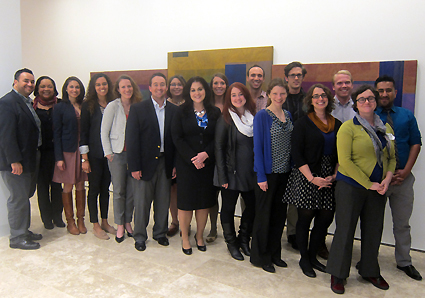Going to APA Convention is an important graduate school experience (and not just to add another line or two to your CV!). We all know the drill with presenting our research and beefing up our CVs, but Convention has much more to offer! Here are some of my top reasons to attend Convention.
- Permission to Dabble!
Graduate school is an odd combination of being indoctrinated by your advisor and learning to critically evaluate everything you think you know (or are told). Sometimes our focus becomes pretty limited by our long-days and late-nights working on our own research – for me White racial identity development among academicians in psychology. Convention provides opportunities to branch out and see what the rest of psychology is up to! My Convention guilty-pleasures (i.e., not related to my own research) are sessions on mental health disparities, feminist roundtables, and racial injustice advocacy. I encourage you to find your own guilty-pleasures and indulge!
- Networking

An APAGS Member met Dr. Philip Zimbardo at an APAGS Food for Thought Breakfast.
Really, networking could be reasons 1- 5. Regardless of where you are in your program, networking is crucial. As a second-year doctoral student, I met my future internship training director at Convention. I’m not saying that I matched solely because of this happenstance meeting, but I’m pretty sure I left a favorable impression! Now as I am transitioning to my first job-search as a psychologist, having THOUSANDS of potentials psychologists in one place feels like a dream! I am also always on the lookout for a celebrity psychologist sighting, so that I can have a fan-girl moment…
- Any Excuse to Get Out of [INSERT COLLEGE TOWN HERE]
Graduate students who have the luxury of going to school in New York City, Southern California, or Miami may not feel my pain, but I can always use an excuse to get out of Lexington, KY. While the Horse Capital of the World boasts a cheap cost of living and mild winters, I find myself needing a break from the college town milieu. Convention is a great way to double dip – professional development and mini-vacation! Denver has a lot to offer budget-minded graduate students, such as several microbreweries, Colorado Rockies games, and several day-hikes right outside of the city. Don’t forget to take some time for self-care and enjoy Denver!
- Sessions for Students, by Students
Faculty always say that they vividly remember the plight of graduate school… right before they give you a 48-hour deadline of reworking a manuscript and then go home for the evening at 5pm… However, faculty can forget all too soon that graduate students have unique struggles and concerns. The APAGS Convention Committee provides student-focused programming in response to student feedback and needs. In Denver, APAGS has prepared programs for stats-phobic students (Stats Phobia: Learn How to Learn Stats [and Work past Beginners Anxiety]), students who moonlight as parents (or maybe the other way around; Two P’s in a Pod: Balancing Parenthood with Psychology Training and Careers), and students from a variety of diverse identities and backgrounds (Connecting with our queerness: Four contemporary takes on being an LGBTQ(A) psychologist & Conducting Research on Marginalized Identities: When Research is “Me-Search”). For the full APAGS Convention schedule, be on the lookout for the APAGS Convention Booklet that will be released closer to Convention or visit the APAGS Convention website!


